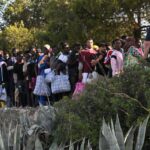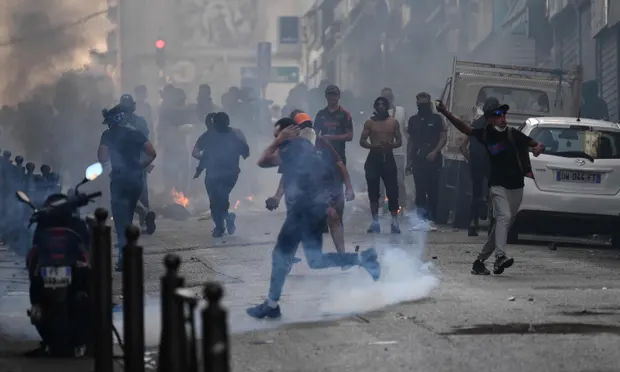Inside, Emmanuel Macron was sharing a typically polished vision of a rejuvenated, safer Marseille. Yet it was outside the spruced-up gym in the impoverished Busserine district – tensions building on the hottest day of the year – where the real story was playing out.
Little more than 12 hours before the police killing of a 17-year-old boy 500 miles north in Nanterre would convulse the country, scores of officers clutching assault rifles and bulletproof riot shields clashed with teenagers of north African descent, trading insults as officers profiled potential troublemakers.
Wassida Kessaci had decided not to join the crowd monitoring the French president’s trip to Marseille last week. Partly because Macron disappointed her; partly because she had been visiting Busserine too often of late.
Most recently on 24 April, when she met a mother whose teenage son was shot in the head as he sat on a sofa, metres from where the French president now held court. Weeks earlier, she comforted another mother of a young man whose blackened body was found in the locked boot of a torched car. “All this in the same place where Macron was speaking,” she said.
As evening approached on Monday, Macron continued with his vision for the quartiers nord, the deprived swath of the city that contained Busserine. Outside, the jostling continued. More officers arrived.
Within the gym, Kessaci’s 19-year-old French-Algerian son, Amine, asked Macron if he intended to reintroduce community policing to repair the broken relationship between Marseille’s north African heritage community and an increasingly aloof, militarised force.
Amine spoke with urgency, reflecting the anguish he had encountered since Macron last came to Marseille in 2021.
Since then Amine and his mother had visited 55 grief-stricken families from the quartiers nord, each having lost a child to the city’s unrelenting drug wars. Both knew the tempo of killings and the levels of brutality were accelerating. But Macron offered little in response. “He didn’t really answer,” said Amine.
The president of France could say he had ventured into the notorious cités – council estates – that dominate the north of Marseille, but everyone knew he hadn’t, at least not properly.
Instead, Busserine’s residents joked about the mammoth police presence required to guarantee Macron’s safety.
“So that’s where all the police are hiding. How many does one man need?” shouted Hamid, 18.
The presidential convoy would never learn firsthand that just hundreds of metres away, parts of the Marseille road network were no longer governed by the state. Access routes to nearby estates were shut by roadblocks controlled by drug gangs, who decided who came and went – pockets of France’s second city surrendered to traffickers.
As questions mount over levels of racial profiling by French police in the wake of the shooting in Nanterre, Marseille serves as a warning of what happens when the police lose control – or abandon – a community.
More broadly, the port is seen as a litmus test for France; if its most multicultural city can foster vast Muslim enclaves viewed with broad suspicion or hostility by the police, then what hope is there elsewhere?
For many, it came as little surprise that the southern port city witnessed some of the fiercest rioting on Friday night, when 88 people were arrested, a gun shop looted and police engaged in running battles with what they called “violent groups”.
Fearing the worst is yet to come, Marseille’s mayor has urged the government to immediately send more troops to help retain control.
Speaking hours after the video first began circulating of the shooting of the teenager named as Nahel M in a Paris suburb on Tuesday, Amine said the police had already lost all credibility among the residents of Marseille’s cités.
Heavily armed officers occasionally poured into the estates in huge numbers, said Amine, before rapidly retreating, having dished out fines to passersby.
“They come for a few hours and fine everybody for lack of insurance or stupid things. Yet if they put 20 police all day and night in front of the traffickers, it would stop the violence.”
Joseph Downing, a senior lecturer in politics and international relations, who grew up on a London council estate and lives in Marseille, where he has studied the relationship between the cités and police, said it is impossible for Britons to grasp how awful the estates are.
“In terms of the disrepair of the housing stock, the absence of the state – the absence of anybody – we can’t comprehend it’s possible.
“The police are even scared to go there – for us this is unthinkable. These places are literally outside the state. If you call the police as a resident, they will not come.”
Setting Marseille slightly apart from other French cities is the proliferation of Kalashnikovs owned by gangs within the estates, a deadly variable that Downing said offers another excuse for police to swerve such places.
Rafiq, another teenage Busserine resident, added: “They are happy for Arabs to kill one another – for the police, it’s one less Arab.”
The bottom line is that almost two years since Macron last visited Marseille and unveiled a grand plan to improve conditions in the cités, relations with the police and security have both deteriorated dramatically.
Last year a record 32 people were killed in score-settling by the city’s drug gangs. Already this year there have been 23 murders, with more than 50 wounded.
Amine, like everyone else in the quartiers nord, is in no doubt the violence has never been worse.
“It’s become very violent. It’s happening near schools; we have collateral victims all the time – the victims are getting younger.”
Standing like monoliths in front of the Provençal hills that encircle Marseille, the brutalist tower blocks of Frais Vallon constitute its biggest and arguably grimmest cité.
Here, about 7,000 people – average age 36 and mostly of Algerian, Moroccan and Tunisian descent – are crammed into a slither of land hemmed in by motorways.
By Tuesday evening, most of them had seen the footage of Nahel M, who came from a similar high-rise estate in Nanterre, being shot at point-blank range.
Groups of teenagers – known as choufs, the Arabic word for “watchman”, and the lowest rung of gang hierarchy – became animated as they stared at their phones.
By the nearby stairwell of a decrepit 23-storey tower block, a group of “soldiers” stood by one of Frais Vallon’s brazen selling points for cannabis and cocaine. Somewhere inside were the “managers”, who organise the supply of drugs and stash the AK-47 assault rifles.
Above them, invisible, stand the grands barons, stationed in north Africa, occasionally the UK and increasingly Dubai.
The police were nowhere to be seen. Near the selling point, one of Frais Vallon’s first-ever residents approached.uartie
Abdi arrived in 1961 to be reassured her concrete high-rise was temporary accommodation. “It was a place to crash, not a place where I thought I’d be 60 years later,” she said. The 74-year-old accused the state of forgetting about Frais Vallon, allowing it to be taken over by drug cartels.
For the first time since arriving, Abdi wants to return to Tunisia. “It’s become too dangerous. I need to leave and take my 19-year-old grandson to save him,” she said
Amine was born in Frais-Vallon in 2004 and watched as the drugs networks became the dominant employer on the quartiers nord, where youth unemployment can reach 70%.
Out of his former classmates, the teenager can name about 50 who work for the drug gangs. Another 10 are in prison.
Amine beckoned the Observer deeper into the estate, stepping over a dead rat on the pavement, towards the second-floor flat where he grew up. “There,” he said, pointing to a boarded-up window. “That was once the police station on our block, holding 10 officers who everybody knew. Police would play with the children, know who was up to no good, who had begun keeping bad company.”
Amine said it was no surprise that the station’s closure more than 10 years ago coincided with the rapid expansion of Frais Vallon’s organised criminals.
“The police allowed the small-time players to grow bigger, to become international,” said Amine.
The vacuum of effective policing has also allowed a twisted cycle of brutality to fester; ferocious violence that Amine knows too well.
On 29 December 2020 his brother disappeared. For six days his mother scoured the city until tipped off that the 21-year-old would not be coming home.
Brahim Kessaci was found beside another body in the boot of a burned- out car on a road heading out of the city. A third body had been sliced into pieces with a chainsaw and images sent to his traumatised father.
“Without realising, Brahim became friends with someone who was a target. I had brought my kids up to be trusting. I regret that,” said Wassida Kessaci.
Several months before his brother’s death, Amine had set up Association Conscience, a grassroots organisation that demanded better opportunities for young people in the quartiers nord.
His brother’s death shifted its focus to tackling what lay behind Marseille’s soaring youth violence. For the last two years, he has visited dozens of grieving families of victims, most of them barely out of school.
“When I hear about a shooting, I go to give my condolences. At first, it was really hard, but now it’s so frequent, sometimes three times a week. It’s become so normal. I don’t even cry any more.”Often Kessaci volunteers to help inconsolable mothers deal with their loss.
“At the moment I have five who refuse to leave their house,” she said. One has the dried blood of her teenage son on her doorstep, murdered moments after they ate couscous together.
Even the mere mention of the word “barbecue”, or the waft of sizzling meat on a warm evening, can prompt suicidal thoughts for some of the mothers. A “Marseille barbecue” refers to a common gangland killing, where, like Kessaci’s son Brahim, a target is burned, sometimes alive, inside a vehicle.
“Hearing the word ‘barbecue’ causes huge trauma to mothers, some turn to alcohol or drugs. One received a Snapchat of her son’s burned remains.” Each killing leads inevitably to another.
Another grieving mother, Rahem Fana, said the boy who murdered her only son was himself killed a fortnight later.“Nobody knows why, what happened,” she said, blinking back tears. “I no longer have a taste for life. It’s not possible to overcome this pain.”
Fana’s son was stabbed to death on 26 July 2022 by a boy, known to the police, who was jealous of the girl he had dated since he was 14. The police did nothing. Eventually, Kessaci contacted them to at least look into the killing, but still received no response.
Fana said: “They made me feel unworthy. Because I am Muslim, I feel judged, treated differently, less deserving.” Kessaci nodded and added: “We are seen as less human.”
On Friday the United Nations said the unrest sweeping France was an opportunity for its police to “address deep issues of racism”.
Back in Frais Vallon, it was evident that treating its residents as second-class citizens guaranteed a stead supply of young recruits for the trafficking networks.
A battered car was waved down by Amine; inside was a good friend of his murdered brother. “Most of us really want to work,” said the friend. “I’ve applied for so many jobs, even a street cleaner, but was rejected because of my address and because of my [Arabic] name.
“I know friends who receive three rejections and just join the trafficking gangs. It’s dangerous, you might die, but people need something.”
Downing said that another attraction is that in such a discriminatory society, the criminal underworld of Marseille operates as a comparative meritocracy. “Unlike French society that will look down on you for being an Arab, or black, in the criminal world, as long as you’re a decent thief, you’re a decent thief,” he said.
When Amine questioned Macron last week, the teenager might have expected a better response. After all, during the president’s previous trip, Macron was so impressed with the teenager’s determination to help the quartiers nord that the president subsequently invited him to the Élysée Palace to discuss ideas.
Aged just 17 – the same age as Nahel M when shot by French police last week – Amine also received condolences over the death of his brother from Macron’s wife, Brigitte.
His mother also got the five-star treatment during Macron’s previous trip to the port.
“He took my hand and congratulated me for Amine,” she said, noting the irony of someone who had survived decades in the quartiers nord being allocated a bodyguard during the visit.
This time around, she was in no rush to see him. Macron, she said, had indicated their organisation would receive €30,000 but only €10,000 materialised.
His promise to send hundreds of elite police to Marseille did happen, though with apparent little impact. As the failure to adequately police the cités unfolded, trust with their residents collapsed and the flow of vital intelligence to officers dwindled to a trickle.
Within the high-density estates, everybody knows their neighbour. In Marseille, every grieving mother quickly learns who killed their child.
“Every time we know. All the families even know where the weapons are hidden. If the police wanted to solve the killings, they could – the simple fact is they don’t,” said Kessaci .
The lack of police intervention means that bereaved families remain living in the same building as the men they know murdered their son. So far, Amine’s organisation has managed to move 20 mourning families from tower blocks where they would routinely bump into the people who killed their brother or son.
In Brahim’s case, his mother said that only a multitude of tip-offs from the cités encouraged police to act – placing bugs in the cars of the suspected killers, which quickly recorded a confession.
Last week, Amine also asked Macron if he intended to legalise the cannabis trade, a move many feel would promptly destabilise the ever-powerful drug gangs.
Many of Marseille’s victims of violence are killed over the cannabis in a country that is the biggest consumer of the drug in Europe, despite having some of its most repressive laws.
“He didn’t want to talk about cannabis legalisation. But it’s a basic topic that we need to discuss. We’ve lost the war against cannabis – it’s time to legalise it,” said Amine.
Many in the cités view Amine as a mayor of Marseille in waiting. He has stiff competition. Macron has already suggested he would like to one day take the top job in France’s second city. For now, he must contend with nationwide riots that expose a France fractured on race and religion.
For Amine, the events of last week underline his call for community policing and the hope that, at some stage, teenagers such as himself and Nahel M are viewed without fear or prejudice.
Source: The Guardian
















